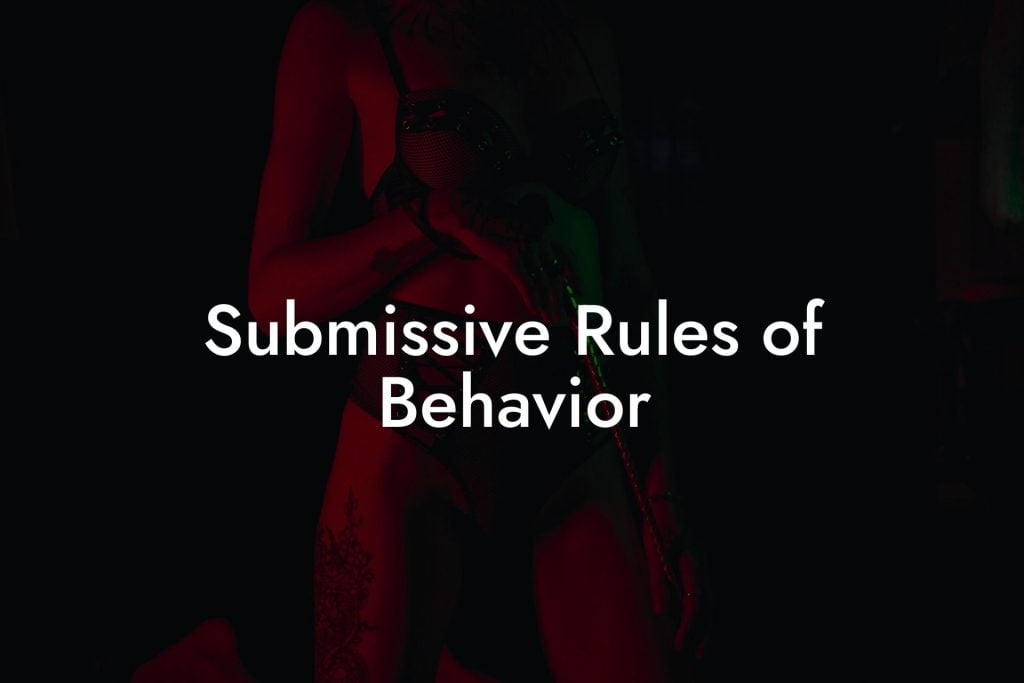When it comes to BDSM, understanding and following rules is crucial for both the dominant and submissive partners. In this article, we will focus on the essential BDSM rules for submissives. Whether you are a seasoned submissive or just starting on your BDSM journey, these rules will help you navigate the complex dynamics of power exchange, ensure mutual respect, and enhance your overall experience as a submissive.
1. Open Communication:
- Communication forms the foundation of a healthy BDSM relationship. Submissives should communicate their desires, limits, and boundaries to their dominant partner.
- Use safe words or signals to ensure clear communication during scenes. Discuss them with your partner beforehand to establish a safe and consensual environment.
- Regularly check in with your dominant to discuss any concerns or adjustments needed to maintain a fulfilling dynamic.
2. Consent:
- Consent is the cornerstone of any BDSM activity. Submissives must provide explicit, informed, and ongoing consent for each experience.
- Educate yourself about different aspects of BDSM and negotiate consent before engaging in any new activities.
- Remember, consent can be withdrawn at any time, and it is crucial to respect each other's boundaries.
3. Trust and Respect:
- Trust is earned and must exist between the dominant and submissive partners. Submissives should trust their dominant partner's ability to guide, protect, and respect their limits.
- Dominants should respect safe words, boundaries, and consent. Submissives should feel secure knowing that their desires and limits will be honored. Trust and respect create a healthy and fulfilling BDSM dynamic.
4. Rituals and Protocol:
- Many submissives find comfort and structure in rituals and protocols. These can be simple acts like kneeling, specific phrases, or daily tasks agreed upon with the dominant.
- Discuss with your partner what rituals or protocols you both enjoy and integrate them into your BDSM dynamic.
BDSM Rules for Submissives Example:
Imagine you are a submissive exploring bondage with your dominant partner. Before engaging in the activity, you communicate your limits and establish a safe word (e.g., "red" to stop immediately). During the scene, you use verbal cues to provide feedback and ensure your comfort. Your dominant always respects your boundaries and immediately releases you if needed. Aftercare is essential, and your partner provides the necessary support and reassurance.
Frequently Asked Questions
What is a BDSM contract?
A BDSM contract is a document that outlines the terms and conditions of the relationship between participants. It reflects the consensual agreement regarding roles, limits, and preferences, ensuring that the dynamic respects everyone's boundaries and needs. While not legally binding, it is a tool used to foster communication, trust, and mutual understanding within a BDSM relationship.
Why are BDSM contracts important?
BDSM contracts are important because they establish clear expectations and consent for all parties involved. They serve as a physical reminder of the agreed-upon dynamics and activities, potentially preventing misunderstandings and ensuring that any play is safe, sane, and consensual.
What should be included in a BDSM contract?
Typically, a BDSM contract should include the names of the parties involved, limits (both hard and soft), safewords, the duration of the contract, privacy considerations, any agreed upon punishments for breaking the contract, and safe sex practices. The document can be as detailed or as general as the parties prefer, but it should reflect the true desires and boundaries of everyone involved.
Can a BDSM contract be changed?
Yes, a BDSM contract is a dynamic document that can and should be revised as the needs, desires, and boundaries of the participants evolve. Amendments should be made with the full consent of all involved parties and discussed openly to ensure ongoing mutual understanding.
What are hard limits and soft limits?
Hard limits are non-negotiable boundaries that cannot be crossed under any circumstances. Soft limits are boundaries that are more flexible and can be explored with caution and mutual agreement, possibly evolving over time.
How do you negotiate a BDSM contract?
Negotiating a BDSM contract involves open and honest dialogue between all parties involved. This conversation should cover each person’s desires, limits, expectations, and any other relevant factors that will affect the dynamic or scenes that will take place. Regular communication and check-ins can also help to modify the contract as needed.
Are safewords necessary in a BDSM relationship?
Yes, safewords are an essential component of BDSM play. They provide a clear, non-ambiguous signal that something is wrong or that a boundary is being approached or crossed, allowing for immediate cessation of the scene if needed.
What if someone breaks the terms of a BDSM contract?
If someone breaks the terms of a BDSM contract, it should be addressed promptly and with open communication. The circumstances and intent behind the breach should be discussed, and the agreement should be reviewed to determine whether modifications are necessary or if the relationship can continue safely and consensually.
How does consent work in BDSM?
Consent in BDSM is an ongoing, mutual agreement where all parties are informed and have freely given their permission to participate. It is specific and can be revoked at any time. Open communication before, during, and after scenes ensures that consent is maintained.
What is a scene in BDSM?
A 'scene' in BDSM refers to a specific period wherein participants engage in various activities according to their roles and established dynamics. Scenes are often pre-negotiated to ensure the comfort and consent of all involved.
How can I establish trust in a BDSM relationship?
Establishing trust in a BDSM relationship involves consistent communication, respect for boundaries, following through on promises, and demonstrating reliability. Being honest and transparent about your abilities, expectations, and limits is also crucial.
What is a safeword, and how should it be chosen?
A safeword is a predetermined word or phrase that participants in BDSM can use to stop the scene immediately. It should be easy to remember, distinctive, and unlikely to be confused with play-talk. Some people use common systems like the traffic light system (green for go, yellow for slow down, red for stop).
Is it possible to involve a professional mediator when drafting a BDSM contract?
While not common, it is possible to involve a professional mediator or a more experienced member of the BDSM community when drafting a contract, especially for more complex dynamics. This can ensure clarity and help educate all parties on best practices.
How can someone safely explore BDSM?
Exploring BDSM safely involves doing research, understanding risks, respecting consent and limits, and starting slowly. Engaging with the BDSM community for guidance and potentially participating in workshops or classes can be helpful. Prioritizing communication and enlisting safe, sane, and consensual practices are vital for safety.
Can a person revoke consent during a BDSM scene?
Yes, consent can be revoked at any point during a BDSM scene. If consent is withdrawn, all activities should cease immediately, and the well-being of those involved should be addressed.
What if I change my mind about my limits?
If you change your mind about your limits, you should communicate this to your partner(s) outside of a scene to discuss how these changes might be integrated into future activities. Limits can always evolve, but ensuring everyone involved is aware and in agreement is essential.
How long can a BDSM contract last?
A BDSM contract can last for any duration that the parties agree upon—from a single scene to a long-term dynamic. The length of the contract should be discussed and agreed upon by all parties involved.
How do I know if BDSM is right for me?
Knowing if BDSM is right for you involves introspection regarding your desires and interests, learning about BDSM practices, and understanding the importance of consent and safety. Trying out different aspects could help determine if it aligns with your personal preferences. Engaging with the community and potentially seeking a mentor can assist in this exploration.
Should aftercare be included in a BDSM contract?
Aftercare, the period of attention and care following a scene, is an important aspect of BDSM and should be included in a BDSM contract if preferred by the parties. It can encompass physical care, emotional comfort, and discussion about the scene to ensure all parties feel safe and respected.
Is a BDSM contract enforceable in court?
No, BDSM contracts are not legally enforceable in most court systems. They are symbolic and meant to guide relationships, rather than serving as a legal document. However, they can demonstrate the consensual nature of the relationship should legal issues arise.
How do power dynamics work within a BDSM context?
Power dynamics in a BDSM context refer to the agreed-upon roles where one person (the Dominant) takes control, and the other (the Submissive) gives up control within preset boundaries. Dynamics vary greatly between relationships, and they are based on consent, trust, and negotiated terms.
Remember, BDSM is an ongoing journey that requires continuous learning, exploration, and communication. By following these essential BDSM rules for submissives, you can create a healthy and fulfilling power exchange dynamic. Don't forget to check out our Ultimate BDSM Contract Pack, explore more guides on Filthy Adult, and shop for your fetish needs at our online store. Feel free to share this article with others who may benefit from it.













